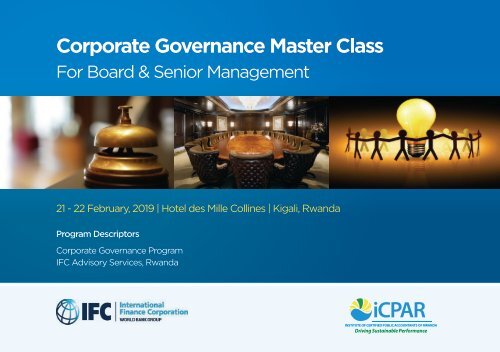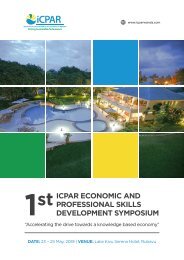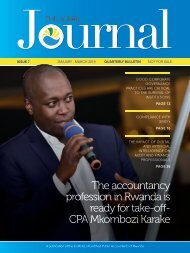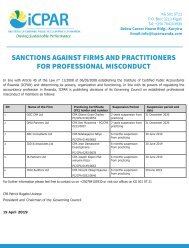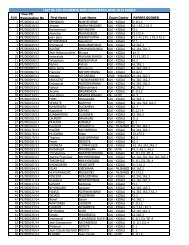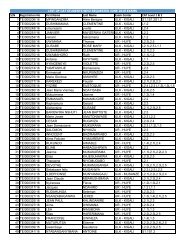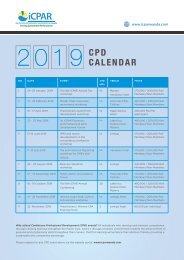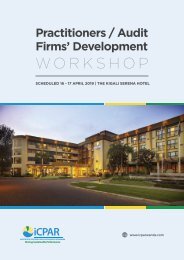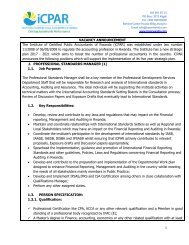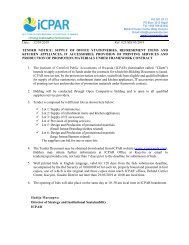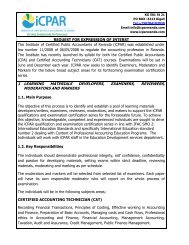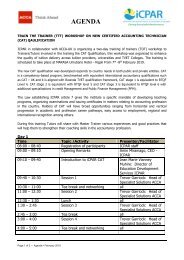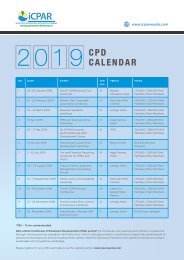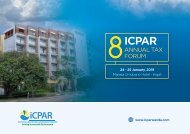2019CorporateGovernance
Create successful ePaper yourself
Turn your PDF publications into a flip-book with our unique Google optimized e-Paper software.
Corporate Governance Master Class<br />
For Board & Senior Management<br />
21 - 22 February, 2019 | Hotel des Mille Collines | Kigali, Rwanda<br />
Program Descriptors<br />
Corporate Governance Program<br />
IFC Advisory Services, Rwanda
International Finance Corporation (IFC) Advisory Services East Africa Corporate Governance Program<br />
2<br />
Background<br />
IFC AS Corporate Governance (CG) Program goal<br />
is to improve corporate governance in the East<br />
Africa region. Towards this goal, the program has<br />
the following objectives: (i) build the business case<br />
for good corporate governance among companies<br />
and companies; (ii) assist investors in improving<br />
corporate governance practices of investee<br />
companies; (iii) segment the market and focus on<br />
small and medium enterprises and Family-Owned<br />
Enterprises; (iv) further develop and foster training<br />
capacity; and (v) help corporate governance<br />
institutes/institutes of directors on their path to<br />
viability.<br />
International Finance Corporations (IFC) and the<br />
Institute of Certified Public Accountants of Rwanda<br />
(ICPAR) have jointly organized a CG Workshop for<br />
companies to strengthen the expertise and skills of<br />
directors and senior management in terms of good<br />
corporate governance in the country. It is intended<br />
that this training will give insights to the business<br />
society and helping board members and senior<br />
management of companies to understand corporate<br />
governance and its value for their institutions.<br />
Corporate Governance is essential in the financial<br />
sector to instill good risk management practices<br />
and controls. In turn this will improve the quality of<br />
the business and management structures, which will<br />
increase decision making capacity and strengthen<br />
operational efficiency that are prerequisites to<br />
an industry in a certain country to becoming<br />
competitive in the global industry.<br />
Program Overview<br />
The Corporate Governance Workshop is being<br />
offered by IFC through carefully selected<br />
institutions in the East Africa region. The Training<br />
program will educate companies on specific issuesrelated<br />
Corporate Governance topics, including risk<br />
management, compliance and audit, to help them<br />
improve their Corporate Governance practices and<br />
strengthen their control environments. The program<br />
will cover the principles enhancing CG for companies,<br />
including International Corporate Governance<br />
trends and developments, integrating good CG<br />
practices in companies, assigning responsibilities<br />
within an institution, building a high-performance<br />
board, and director duties and liabilities.
Also, the program will tackle the effective control<br />
and management environment of the company,<br />
particularly focusing on the audit committee,<br />
risk procedure and compliance requirements, the<br />
importance of a strong internal audit function,<br />
purpose and function of the audit committee,<br />
insider lending, conflict of interests, good Corporate<br />
Governance practices coming from a stronger<br />
regulated and bureaucratic environment, and the<br />
role of the supervisors.<br />
Who Should Attend<br />
The CG Workshop is designed for board chairs,<br />
board members, directors, senior executive officers,<br />
and top management of companies and financial<br />
institutions in Rwanda.<br />
Program Structure<br />
The whole program consists of eleven related<br />
modules to be delivered in two days training period.<br />
This program will also feature a panel discussion and<br />
be delivered in English.<br />
Module Descriptors<br />
PART I<br />
Introduction to<br />
Corporate Governance<br />
PART II<br />
Global Financial Crisis<br />
- Business case for CG<br />
PART III<br />
Building an effective<br />
and efficient Board<br />
PART IV<br />
CG Regulatory<br />
overview<br />
PART V<br />
Risk Giovernance and<br />
Control Environment<br />
PART VI<br />
Board Committees<br />
PART VII<br />
Minority shareholdres<br />
protection<br />
PART VIII<br />
Communication,<br />
disclosure & transparency<br />
PART IX<br />
Looking behind the<br />
numbers<br />
PART X<br />
Integration<br />
Corporate Governance Program Descriptors www.ifc.org/corporategovernance<br />
3
International Finance Corporation (IFC) Advisory Services East Africa Corporate Governance Program<br />
Agenda<br />
MODULE 1: INTRODUCTION TO CORPORATE GOVERNANCE<br />
09:45 - 11:00 am<br />
Purpose: To explain the concept of and business case for good corporate governance for firms.<br />
Outline:<br />
• Introduction to Corporate Governance<br />
• Unique nature of governance at<br />
companies<br />
• Regulatory views on Corporate<br />
governance<br />
• Corporate governance practices in<br />
Rwanda<br />
• Recipe for the implementation of a<br />
Corporate Governance program<br />
• Troubleshooting guide for directors<br />
ARRIVAL AND REGISTRATION<br />
08:00 – 09:00 am<br />
WELCOME REMARKS<br />
09:00 – 09:45 am<br />
Outcomes:<br />
• Understand the unique nature of Governance at<br />
companies<br />
• Understand the regulatory views on Corporate<br />
Governance practices at companies<br />
• Agree that corporate governance can add value<br />
• Understand the main steps to be undertaken to<br />
implement a Corporate Governance program at a<br />
company<br />
• See some of the critical issues you may face along the<br />
way<br />
Coffee Break 11:00 - 11:15 am<br />
4
MODULE 2:GLOBAL FINANCIAL CRISIS AND IMPLICATIONS – BUSINESS CASE FOR CORPORATE<br />
GOVERNANCE<br />
11:15 am – 12:30 pm<br />
Purpose: To explain the reasons for the financial crisis and the lessons learnt in Corporate Governance and<br />
Risk Management<br />
Outline:<br />
• What went wrong? – Reasons for the<br />
global financial crisis<br />
• Response to the crisis – Regulatory and<br />
Industry response<br />
• Crisis as a lesson in Corporate<br />
governance – Lessons on the Role<br />
of the Board/Senior management,<br />
Remuneration, Risk disclosures and Role<br />
of Shareholders<br />
• Crisis as a lesson in risk management<br />
Outcomes:<br />
• Understand the role played by the regulators, companies,<br />
rating agencies and funds in the crisis<br />
• Understand both the industry and regulatory responses<br />
to the financial crisis<br />
• Derive Corporate and Risk Governance lessons from the<br />
crisis<br />
• Derive lessons on risk management from the crisis<br />
Lunch Break 12:30 – 01:30 pm<br />
MODULE 3: THE ROLE OF REGULATORS AND FIRMS TO BUILD SUSTAINABLE PRVATE SECTORS<br />
01:30 – 02:45 pm<br />
Purpose: To explain some of the key areas under local regulations, provide a regulatory overview of<br />
Corporate Governance and address regulatory compliance<br />
Corporate Governance Program Descriptors www.ifc.org/corporategovernance<br />
5
International Finance Corporation (IFC) Advisory Services East Africa Corporate Governance Program<br />
6<br />
Outline:<br />
• Regulatory overview of Corporate<br />
governance<br />
• Regulatory compliance – Approach and<br />
roles and responsibilities<br />
Outcomes:<br />
• Understand the key disclosure requirements<br />
• Understand more about the regulation and how it affects<br />
corporate governance<br />
• Understand regulatory compliance at a company, the<br />
approach and corresponding roles and responsibilities<br />
Coffee Break 02:45 – 03:00 pm<br />
MODULE 4: BUILDING AN EFFECTIVE AND EFFICIENT BOARD OF DIRECTORS<br />
03:00 – 04:30 pm<br />
Purpose: To make boards more effective and dynamic<br />
Outline:<br />
• Introduction: Understanding the role of<br />
the Board<br />
• Understanding the Board composition<br />
– Structure, Operating models, and<br />
Functionaries<br />
• Understanding the Board composition<br />
• ‘Fit and proper’ criteria<br />
• Roles and responsibilities of key Board<br />
members<br />
• Board level committees and composition<br />
• Board performance assessment<br />
• Other vital issues – Board size, meeting<br />
frequency, quorum and remuneration<br />
Outcomes:<br />
• Understand what the board’s responsibilities are<br />
• Understand the composition of the Board – Key<br />
functionaries, Director independence, Chairman/CEO<br />
separation<br />
• Understand the structure of the board committees and<br />
their composition<br />
• Understand the key requirements for a Board member –<br />
Qualifications, time commitment<br />
• Understand how to measure directors’ effectiveness/<br />
success criteria<br />
• Understand some of the problems along the way<br />
Day-1 Evaluation; End of Day-1 Program 04:30 - 04:45 pm
Arrival and Registration<br />
08:00 – 09:00 am<br />
MODULE 6: SETTING UP BOARD AUDIT COMMITTEE – ROLES AND RESPONSIBILITIES<br />
09:00 – 10:15 am<br />
Purpose: To explain the importance and the functions of the audit committee in supporting Corporate<br />
Governance<br />
Outline:<br />
• Audit committee – Introduction and composition<br />
• Where does it fit in the corporate governance<br />
picture?<br />
• Regulatory views on the Audit committee<br />
• Roles and responsibilities of the Audit committee<br />
• Implementation: Building an effective audit<br />
committee<br />
• Establishing Audit committee interactions<br />
• Troubleshooting guide for board members<br />
Outcomes:<br />
• Understand the importance of the<br />
audit committee’s role in corporate<br />
governance<br />
• Understand the organization and<br />
composition of the Audit committee<br />
• Appreciate and understand how<br />
internal audit contributes to Corporate<br />
Governance<br />
• Understand the role Compliance and<br />
External audit play in the Internal<br />
control architecture<br />
• Understand its relationship with internal<br />
and external audit, risk management<br />
and compliance<br />
Corporate Governance Program Descriptors www.ifc.org/corporategovernance<br />
Coffee Break 10:15 - 10:30 am<br />
7
International Finance Corporation (IFC) Advisory Services East Africa Corporate Governance Program<br />
MODULE 8: COMMUNICATION, DISCLOSURE AND TRANSAPRENCY<br />
10:30am – 12:00noon<br />
Purpose: To explain the importance of communication, transparency and disclosure in delivering and<br />
demonstrating sound Corporate Governance<br />
Outline:<br />
• Communication and Corporate governance – Where<br />
does it fit?<br />
• Disclosure and Transparency – Regulatory views<br />
• Internal communication at listed companies –<br />
Vehicles, Stakeholders and Roles and responsibilities<br />
• External communication at listed companies –<br />
Vehicles, Stakeholders and Roles and responsibilities<br />
• Financial information communication<br />
• Disclosure requirements at Indonesian capital<br />
market<br />
• Troubleshooting guide for board members<br />
Outcomes:<br />
Lunch Break 12:00 – 01:00 pm<br />
• Understand the importance managing<br />
internal and external communication<br />
• Understand the internal and external<br />
interactions of a company<br />
• The need for experts to manage<br />
dialogue with press, markets and<br />
investors<br />
• Understand the regulatory views on<br />
disclosure and transparency<br />
8
MODULE 5: RISK GOVERNANCE AND CONTROL ENVIRONMENT FOR COMPANIES<br />
01:00 – 02:30pm<br />
Purpose:To explain the importance and role of management control environment in supporting Corporate<br />
Governance<br />
Outline:<br />
• Introduction to risk governance and the 3 lines of<br />
defense framework<br />
• Risk governance in Indonesia<br />
• Recipe for the development of a risk governance<br />
framework at a company<br />
• Role of the CRO<br />
• Risk management related roles and responsibilities<br />
• Introduction to Management control<br />
• Key elements of management control – Internal audit,<br />
External audit, Compliance, Internal controls<br />
• Role of ‘Internal Controls’ at a company – Key<br />
components of Internal controls<br />
• Internal audit and Corporate governance<br />
• Introduction to the Compliance function<br />
• External audit<br />
• Planning and monitoring function<br />
Outcomes:<br />
Coffee Break 02:30 – 02:45 pm<br />
• Understand the key functionaries of a<br />
company’s risk governance framework<br />
• Understand the considerations in<br />
developing the risk governance structure<br />
• Understand the implementation steps<br />
• Understand the key concepts involved in<br />
the 3 lines of defense framework<br />
• Understand the role of the CRO and the<br />
reporting lines of the CRO<br />
• Understand risk management related roles<br />
and responsibilities<br />
• Understand the key elements of<br />
management control and their role in<br />
Corporate governance<br />
• Understand the components of internal<br />
controls and its framework<br />
• Understand the role Risk management<br />
plays in Internal controls<br />
Corporate Governance Program Descriptors www.ifc.org/corporategovernance<br />
9
International Finance Corporation (IFC) Advisory Services East Africa Corporate Governance Program<br />
MODULE 7: MINORITY SHAREHOLDERS PROTECTION<br />
02:45 – 04:00 pm<br />
Purpose:To help directors understand the rights of shareholders, particularly minority shareholders<br />
Outline:<br />
• Introduction to shareholders’ rights and<br />
responsibilities<br />
• Mechanism of organizing General Meeting of<br />
Shareholders<br />
• Company information that needs to be shared to all<br />
shareholders<br />
• Shareholder practices and interaction<br />
• Troubleshooting guide for board members<br />
Outcomes:<br />
An Overview of IFC CG Excellence Program in Rwanda<br />
04:00 – 04:30 pm<br />
Day-2 Evaluation; Closing Remarks<br />
End of the Program<br />
04:30 - 05:00 pm<br />
• Understand how to setup proper<br />
shareholder practices in a publicly-listed<br />
company<br />
• Understand the rights and responsibilities<br />
of shareholders<br />
• Understand best practices in organizing<br />
General Meeting of Shareholders<br />
• Understand the stakeholders’ interests<br />
10
Training Methodology<br />
Instructors: IFC experts on corporate governance issues will deliver the course in an interactive manner to<br />
allow and encourage peer discussions among the participants. Course materials will comprise of PowerPoint<br />
presentations, background materials (e.g. articles and papers), case studies and global best practices.<br />
Your Investment:<br />
Your investment: Rwf. 200,000 for members and Rwf. 230,000 for Non-members (VAT inclusive). Fees are<br />
payable to Bank of Kigali A/C No: 00040-0335616-29 or Ecobank A/C No: 110-04413101-72.<br />
Save a 5 % early bird discount by paying by or before 13 th February 2019.<br />
Certificates<br />
Certificates of attendance will be awarded to all participants who attend and participate in all sessions of the<br />
workshop. For members, Fourteen (14) CPD – Continuous Professional Development hours will be awarded as<br />
per the IFAC requirements.<br />
For further inquiries please contact:<br />
Sunday.kalisa@icparwanda.com/ yahya.hassani@icparwanda.com<br />
or call on +250 788 302 441 | +250 788 306 881.<br />
Corporate Governance Program Descriptors www.ifc.org/corporategovernance<br />
11
For more information<br />
www.icparwanda.com


